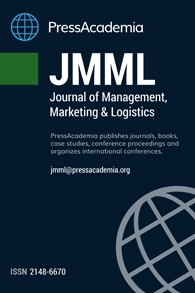THE EFFECTS OF MARKET ORIENTATION ON BUSINESS PERFORMANCE: AN EMPIRICAL RESEARCH ON TRAVEL AGENCIES LOCATED IN ISTANBUL
THE EFFECTS OF MARKET ORIENTATION ON BUSINESS PERFORMANCE: AN EMPIRICAL RESEARCH ON TRAVEL AGENCIES LOCATED IN ISTANBUL
___
- Aksulu, İ.ve Özgül, E. (1999), “Değişen Pazarlama Çevresi ve Pazarlamada Yeni Yaklaşımlar”, 4. Ulusal Pazarlama
- Kongresi, Mustafa Kemal Üniversitesi, İktisadi ve İdari Bilimler Fakültesi, 18-20 Kasım, ss. 83-94. Avlonitis, G. H. ve Spiros P. G. (1999), “Marketing Orientation and its Determinants: An Empirical Analysis”,
- European Journal of Marketing European Journal of Marketing, Vol. 33, No. 11-12, pp. 1003-1037.
- Bulut, Ç., Yilmaz C. ve Alpkan L. (2009), “Pazar Oryantasyonu Boyutlarının Firma Performansına Etkileri”, Ege Akademik Bakış, 9 (2): 513-538.
- Çakici, C. ve Duygu E. (2005), “Otel İşletmeciliğinde Pazar Yönlülük ve Pazar Yönlülük Performans İlişkisi Üzerine
- Bir Araştırma ve Sonuçları” Hacettepe Üniversitesi, İktisadi ve İdari Bilimler Fakültesi Dergisi, Cilt 23, Sayı 1, ss. 157-1
- Çati, K. ve Işkin, M. (2008), “Pazar Yönlülük”, Güncel Pazarlama Yaklaşımlarından Seçmeler, Editörler: İnci VARİNLİ ve Kahraman ÇATI, Detay Yayıncılık, Ankara, s. 77-101.
- Day, G. S. (1994), “Capabilities of Market-Driven Organizations”, The Journal of Marketing, Vol. 58, No.4, pp. 37
- Desphande, R. and Frederick, W. E. (1989), “Organizational Culture and Marketing : Defining the Research
- Agenda”, Journal of Marketing, 53, pp. 3-15. Desphande, R., John, F. U. ve Frederick, W. E. (1993), “Corporate Culture, Customer Orientation and Innovativeness in Japanese Firms: A Quadrad Analysis”, The Journal of Marketing, Vol. 57, No. 1, pp. 23-37.
- Eren, D. (2003), “Otel işletmeciliğinde Pazarlama Anlayışı ve Pazar Yönlülük: Türkiye`de Faaliyet Gösteren Dört ve Beş Yıldızlı Otellerde Yapılan Bir Araştırma ve Sonuçları”, Basılmamış Yüksek Lisans Tezi, Mersin Üniversitesi,
- Sosyal Bilimler Enstitüsü, Mersin. Ganesan, S. (1994), “Determinants of Long-Term Orientation in Buyer-Seller Relationship”, Journal of Marketing, Vol. 58 (April), pp. 1-19.
- Greenley, G. E. (1995), “Forms of Market Orientation in UK Companies”, Journal of Management Studies, Vol. 32, Is. 1, pp. 47-66.
- Guo, C. (2002), “Market Orientation and Business Performance: A Framework for Service Organizations”,
- European Journal of Marketing, Vol. 36, No. 9-10, pp. 1154-1163
- Heiens, R. A. (2000), “Market Orientation: Toward An Integrated Framework”, Academy of Marketing Science Review, No. 1, p. 1-4.
- Jap, S. D., Manolis C., Weitz B. A. (1999), “Relationship Quality and Buyer-Seller Interactions in Channel
- Distribution”, Journal of Business Research, Vol. 46, pp. 303-313. Jaworski, B.J. ve Kohli, A. K. (1993), “Market Orientation: Antecedents and Consequences”, The Journal of
- Marketing, Vol. 57. No. 3, pp. 53-70. Kohli, A. K. ve Jaworski, B. J. (1990), “Market Orientation: Construct, Research Propositions and Managerial
- Implications”, The Journal of Marketing, Vol. 54, No.2, pp. 1-18. Matsuno, K., Mentzer, J. T. ve RENTZ, J. O. (2000), “A Refinement and Validation of the MARKOR Scale”, Journal of Academy of Marketing Science, Vol. 28, No. 4, pp. 527-539.
- Narver, J. C. ve Slater, S. F. (1990), “The Effect of Market Orientation on Business Profitability”, The Journal of
- Marketing, Vol. 54, No. 4, pp. 20-35. Papatya, N., Papatya G. ve Songur A. (2011), “Hizmet İşletmelerinde Pazar Yönlülük ve Turizm Sektörü İşletme
- Uygulamalarının Değerlendirilmesi: Isparta örneği”, I. Uluslararası 4. Ulusal Eğirdir Turizm Sempozyumu ve Göller Bölgesi Çalıştayı, 1-4 Aralık 2011, Eğirdir, Isparta, ss. 751-764.
- Pitt, L., Caruana, A. ve Berthon, P. R. (1996), “Market Orientation and Business Performance: Some European
- Evidence”, International Marketing Review, Vol. 13, No.1, pp. 5-18.. Qu, R. ve Christine, T. E. (2003), “An Examination of the Consequences of Market Orientation in China”, Journal of Strategic Management, 11 (3): 201-214.
- Rose, G.M. ve Shoham, A. (2002), “Export Performance and Market Orientation: Establishing an Empirical Link”,
- Journal of Business Research, Vol. 55 No. 3, pp. 217-25. Ruekert, R.W. (1992), “Developing a Market Orientation: An Organizational Strategy Perspective”, International
- Journal of Research in Marketing, Vol. 9 Is. 3, pp. 225-245. Sanzo, M. J., Santos, M. L. Vazquez, R. ve Alvarez, L. I. (2003), “The Effect of Market Orientation on Buyer-Seller
- Relationship Satisfaction”, Industrial Marketing Management, Vol. 32, pp. 327-345. Shapiro, P. B. (1988), “What The Hell Is “Market Orientation”, Harvard Business Review, 66 (6): 119-125.
- Shoham, A. ve Gregory M. R. (2001), “Market Orientation: A Replication, Cross-National Comparison, and Extension”, Journal of Global Marketing, 14: 4, pp. 5-25.
- Slater, S. ve John, N. C. (1994), “Does Competitive Environment Moderate the Market Orientation-Performance
- Relationship?”, The Journal of Marketing, Vol. 58, No. 1, pp. 46-55. Slater, S. ve John, N. C. (2000), “The Positive Effect of a Market Orientation on Business Profitability: A Balanced
- Replication”, Journal of Business Research, 2000 (48): 69-73.
- Webster, F. E. (1988), “The Rediscovery Of The Marketing Concept” Business Horizons, Cilt 31, pp. 29-39.
- Wilson, D. T. (1995), “An Integrated Model of Buyer-Seller Relationships”, Journal of Academy and Marketing Science, Vol. 23, No. 4, pp. 335-345.
- Yılmaz, C., Alpkan, L ve Bulut Ç. (2009), Firmaların Kültürel Oryantasyonlarının Çeşitli Performans Boyutlarına
- Etkileri: Türk İmalat ve Hizmet İşletmeleri Üzerine Bir saha Çalışması” Journal of Yasar University, (4)-16, ss. 246
- Yayın Aralığı: Yılda 4 Sayı
- Başlangıç: 2014
- Yayıncı: PressAcademia
STRATEGIC IMPACT OF INWARD FOREIGN DIRECT INVESTMENTS ON THE LABOUR MARKETS OF DEVELOPING ECONOMIES
IMPROVING PASSENGER SATISFACTION AT AIRPORTS: AN ANALYSIS FOR SHORTENING BAGGAGE ACCESS TIME
Bengu Sevil Oflac, Isik Ozge Yumuryaci
WORKPLACE EMOTIONAL INTELLIGENCE AND RETURN ON INVESTMENT IN THE NIGERIAN BANKING INDUSTRY
Seyit Ahmet Solmaz, Oguz Turkay, Salim Ibis, Umit Sengel
